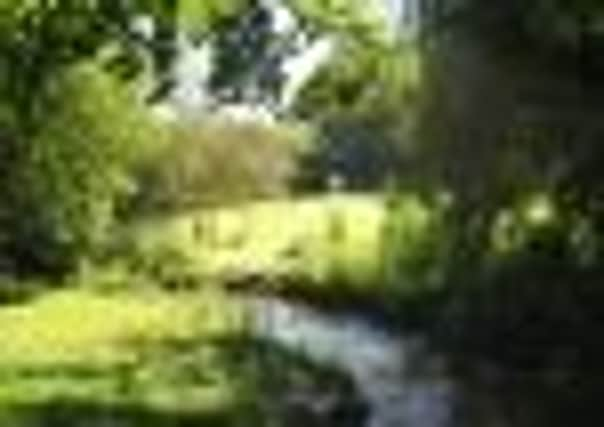Lincolnshire echoes


The rain buckets down as we drive south through Lincolnshire to meet the next Grand Champion of England. With next year’s 60th anniversary of the Queen’s Coronation in mind, we’re heading to Scrivelsby Court, near Horncastle, home of the Dymoke family, who have been Grand Champions since 1350.
They represent the sort of deep-rooted tradition and pageantry that foreigners love about Britain. The Grand Champion – often called King’s or Queen’s Champion – pledges to take on anyone who denies the monarch’s right to rule.
Advertisement
Hide AdAdvertisement
Hide AdUntil a mere 200 years ago, his great moment came when he rode into Westminster Hall during the Coronation Banquet and challenged doubters to single combat. Wearing full armour, he literally threw down a gauntlet and waited for someone to pick it up. No-one ever did, but the option was always there.
My wife and I drive through the undulating, open landscape of the Lincolnshire Wolds and follow winding hedgerow lanes to reach the Scrivelsby estate. Under the estate’s Lion Gate, topped by a rather camp stone lion, and at the end of a long drive, we’re met by Francis Dymoke, son and heir to the Queen’s Champion, Lt Col John Dymoke. So how many generations has the title been in the family, I ask. “Thirty four,” says Gail, Francis’ wife. Thirty-four generations? “It will be easier if I go and get the family tree,” she says.
While she’s away, a bit of background. My wife and I are exploring the Lincolnshire Wolds, a lovely and little-known corner of England. Their most famous son, Tennyson, was born in the village of Somersby, half a dozen miles from Scrivelsby, and went to school in Louth, where we’re staying. It’s the sort of characterful, old-fashioned market town you assume must have disappeared years ago. Back in the late 1940s, Arthur Mee’s King’s England described it in language as lyrical as the countryside around it: “Louth has known how to grow old gracefully. With its narrow, winding streets, and old inns, houses and shops, it gathers about a marketplace of irregular shape – a clean and trim town wearing a quiet air of prosperity and self-respect.”
Most of that holds true today, thanks to an accident of history. Louth is out on a limb, with no railway links and a long way from the nearest motorway. Miraculously, post-war planners hardly touched it. So it has kept much of its individuality, charm and community feel, with plenty of independent (and award-winning) food shops and no hint of second-home chi-chi.
Advertisement
Hide AdAdvertisement
Hide AdAnyone who has driven from Yorkshire to Skegness will probably know it. One of the main routes to the resort passes through its centre, taking a sharp right turn at St James’ Church, whose needle-thin 295 ft tower boasts England’s tallest Anglican parish church spire. As we arrive, the church is surrounded by wedding cars, but there’s no wedding inside. The cars have come for a wedding fair, with caterers, dressmakers, photographers, singers, harpists... and churches.
Inside St James’s, a scene of great activity is being watched by carved angels, who crouch in the rafters like divers about to launch themselves into a pool of eternity. Representatives of two dozen local churches have set out their stalls for prospective brides and grooms. Which to choose? St Mary’s, Ludborough or St Vedast’s, Tathwell? St Martin’s, Withcall or All Saints, Legbourne? But there’s no vulgar touting for custom.
“We’re saying: ‘Have you considered having your wedding in a church rather than a hotel or a town hall?’” says the Rev Chris Turner. “People often think a church is the right place to get married but don’t always know how to make that connection if they haven’t been in one for 20 years. There’s so much competition now and churches are often tucked away.”
Louth itself feels tucked away, behind streets called Pawnshop Passage, Spout Yard, Gospelgate and Pippin Close. Across the Market Place from the offices where Tennyson’s first poems were printed (now an Oxfam shop) is Eve & Ranshaw, a delightful department store founded in 1781 by the paradisically named Adam Eve.
Advertisement
Hide AdAdvertisement
Hide AdWith its sign proclaiming that it has been trading “under nine reigns”, from George III to Elizabeth II, it’s the place to come for wide-fitting shoes and the like.
“Most towns now have a town centre like every other,” says owner David Sandwith. “Most have got a Tesco and a Sainsbury, but we’re fighting that. We’re a bit of a secret, we like to think.”
Back at Scrivelsby, Gail Dymoke returns with a framed family tree. Tree? This is more a Lincolnshire forest. Francis, a farmer, explains that the role is now more ceremonial than combative and that his father, unwell on the day we visit, carried one of the Standards at the 1953 Coronation, “the most memorable day of his life”.
He takes us to Scrivelsby church, where members of the Dymoke dynasty gaze out from monuments.
Advertisement
Hide AdAdvertisement
Hide AdFrancis hopes to succeed his father as Champion. “But nothing’s certain,” he says. “I’ve had a lifetime’s build-up to something that may not happen.” And then, almost casually, he adds: “I was at school with my 22nd cousin.”
Getting there
Kenwick Park Hotel (01507 608806; www.kenwick-park.co.uk) is a comfortable Best Western hotel in wooded grounds on the edge of Louth. It has a country club atmosphere and a championship-standard golf course. B&B doubles from £95.
Further information: Louth Tourist Information Centre: 01507 601111; www.visitlincolnshire.com.